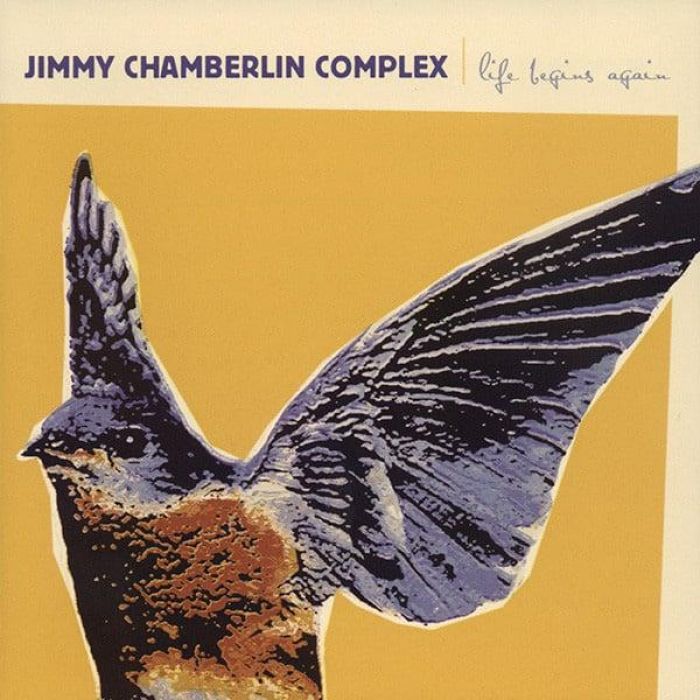Life Begins Again by The Jimmy Chamberlin Complex (Review)

Is it alright for me confess that I was never much of a Smashing Pumpkins fan? I mean, I knew a couple of their songs, and even borrowed Siamese Dream from a friend in high school (but I never listened to the whole thing). I realize that Billy Corgan and Co. were the big alternative band of the mid/late ’90s, the one that gave you instant cred the moment you mentioned you owned Gish, but I think I was too wrapped up in the early stages of my goth phase to really notice.
As a result, I was initially cautious when it came to approaching this album. For starters, I’d have no historical context in which to place it. I wouldn’t be able to wax nostalgic about my Pumpkins fixation, and how Chamberlin’s album took me back to the good old days. Nor would I be able to lament how much he’d faded away since his past gig’s demise, how much this disc represented a last, desperate effort by the man.
And so, God forbid, I guess I just have to take the album on its own terms. I will admit that I was a little worried that this might well represent the efforts of a man past his prime trying to cash in on some modern rock fad or phase. And, being the cynic that I am, the statements by Chamberlin concerning “cosmic vibrations” and whatnot also threw up a red flag or two.
Thankfully, Chamberlin doesn’t just try to cash in on popular trends, but rather, seems fully interested in writing real songs that contain actual artistic merit on their own. The album begins on a stellar note with the Tortoise-y “Streetcrawler,” which coasts along on Chamberlin’s intricate drumming, shifting guitar chords, Billy Mohler’s distant falsetto, and most noticeably Adam Benjamin’s deft Fender Rhodes. As the song progresses, it eventually morphs into a lumbering jam session, the low-end rising up like a tar pit while the guitar thrashes about in its midst.
Although the album contains a number of noteworthy contributors, such as Catherine Wheel’s Rob Dickinson (who lends his voice on two tracks) and Billy Corgan (who sings on “Loki Cat”), the Complex is at its best when it’s sticks to just the four of them jamming about.
“P.S.A” drifts along on clouds of Mohler’s wispy guitar, as Bejamin’s Rhodes pulses in the background like distant satellites. “Cranes Of Prey” is a rather schizophrenic song, moving from spacey Rhodes signals to wiry guitars that venture a bit too close to “nu metal” territory before falling back into more lush, laidback sonics. “Owed To Darryl” is another jam that seems to fall in the same vibe as Tortoise and their ilk, full of undulating basslines, more of Chamberlin’s dextrous drumming, and a wonderful Rhodes solo by Benjamin that squawks and gurgles like an chorus of dial-up modems.
Lyrically, Chamberlin claims the album is about spiritual freedom, specifically freedom through music. That may be so, but a quick perusal of the lyrics also reveals a certain fascination with the darker side of life, and of trying to reconcile the two. On the title track, Rob Dickinson sings “With every breath you take life begins again/And every time you whisper death starts to descend,” and on “Loki Cat” (one of the album’s most pensive and enveloping moments), Corgan muses “Who are we to complain when God takes things away/Is it enough to confess some sadness?”
As the album progresses, Chamberlin’s outlook does seem to lighten on tracks such as “Love Is Real” and “Newerwaves.” “Newerwaves,” with its surging guitars and insistent percussion, is a clarion call, matched by lyrics such as “When despair takes your hand all you do is worry…/Soon a place called yesterday will be gone forever and a new love of today will come and you will fly.” Admittedly, on paper that seems a bit cheesy, but the Complex’ music lends it the necessary heft.
And finally, the album ends with Bill Medley (of Righteous Brothers fame) singing “Close your eyes/Sleep tight tonight and dream/My dear rest your head/The sun will rise and I’ll be here.” However, as if to temper such optimism, the album ends with a short reprise of “Loki Cat” which leaves behind a somewhat pensive note.
Life Begins Again isn’t simply yet another album by some washed up has-been desperately trying to cash in on former fame and glory — not by a longshot. I can’t speak for former Pumpkins fans, or even former Zwan fans, but I found the disc to be a very solid debut from a group that clearly knows their strengths and plays to them consistently from beginning to end.